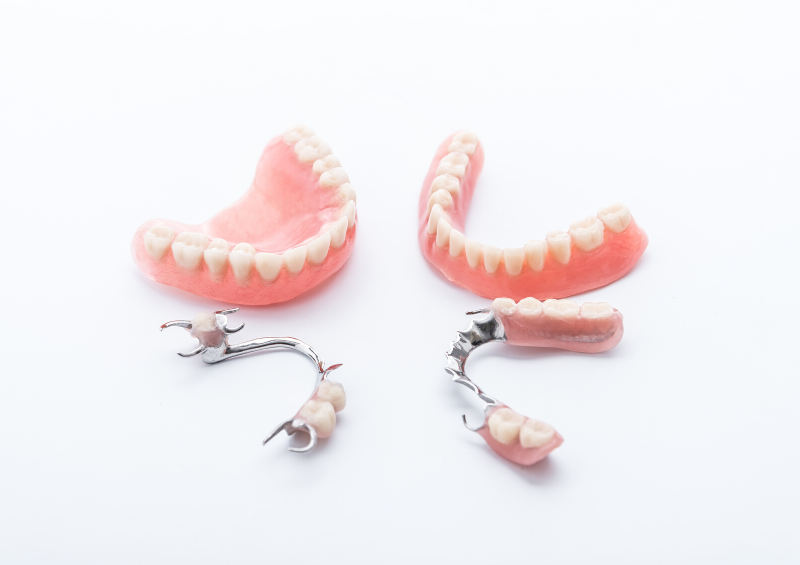
Partial and Complete Dentures
Dentures in Pointe-Claire West Island
Dentures are artificial teeth that replace your natural teeth and gums. They can restore your ability to speak clearly, chew food and smile with confidence. Partial or complete, dentures are always removable.
At Pointe-Claire Dental, our denturist and dentist work together to offer you the treatment alternative that best fits your needs.
Partial dentures
Partial dentures are usually made of several artificial teeth attached to a gum-coloured plastic base. The partial may connect to your teeth through a metal framework and clasps or through other more natural-looking connecting systems or be supported by dental implants.
A partial denture is an appropriate option when your adjoining teeth are not strong enough or when you have too many consecutive teeth missing.
The denturist at our dental clinic in Pointe Claire, will take impressions of your teeth and make a model to bring to the laboratory that will custom-manufacture your partial denture.

Complete dentures
Complete dentures are generally used when most or all your natural teeth are missing. It is possible to have upper and/or lower dentures. Complete dentures come in two types: immediate and conventional.
Immediate dentures
Immediate dentures are made before your teeth are extracted. During your first visit, the denturist will take impressions of your gums and mouth as well as measure and make models of your jaws. Based on these, a model of your dentures will be created and tested for fit before making the final dentures.
As soon as your teeth are removed by the dentist, the denturist will insert the immediate dentures. Their major advantage is that you will have teeth all through the healing period. Once your bones and gums have completely mended, your immediate dentures may require some adjustments to fit properly.
Conventional dentures
Conventional dentures are made after your teeth have been extracted and your bones and gums have completely healed. Our denturist will take impressions of your gums and teeth to create a model that will be brought to the laboratory to cast your custom-made denture.

It is possible to attain better stability on dentures by fixing them on implants. The dental implants that support these dentures are embedded in the bone, giving them added strength and preventing them from slipping. Dental implants stimulate the bone and, as a result, the bone is far less likely to resorb or shrink.
Caring for your dentures
Partial and complete dentures require the same rigorous daily oral hygiene as your natural teeth. Neglecting to do so could cause problems not only to your dentures but also to your own teeth.
- Brush all the surfaces of them every day just using a soft-bristle brush and water to remove plaque and any residues of food.
- Rinse them with water after each meal.
- Remove them every night to allow the gum tissue to rest.
- Do not let them dry out. When you are not wearing them make sure to let them soak in cold water.
As you age, your mouth naturally changes, which can affect the fit of the denture. Dentures that do not fit properly should be adjusted by the dentist or denturist. Poorly fitting dentures can cause various problems, including sores or infections. See your dentist promptly if your denture becomes loose, and also make sure to maintain your routine checkups.
